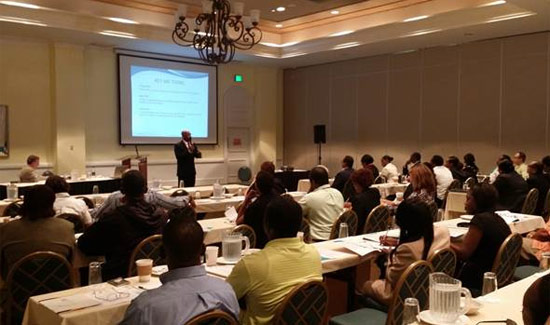
TORONTO, Canada — At a presentation at the Jamaican Canadian Centre (JCA) in Toronto, Canada, on Saturday, hosted by the organisers of the Peaceful Caribbean Conference, due to be held in Barbados next month, Peter Sloly, Deputy Chief of Toronto’s Divisional Policing Command, spoke about his wide experience in law enforcement and the issues of increasing crime and violence in the Caribbean.
“You have to weed out the bad cops; we have the same issues in the city of Toronto. The people who you deal with are sophisticated, move money around the world through safe ports, if your local station lacks the same level of equipment, you will not be able to keep up. So investment in the infrastructure is critically important as investing in the people who keep up the systems – the officers,” Sloly said.
He pointed out that the war on drugs has been going on for years and there is no need to reinvent the wheel.
“Don’t start from scratch, the solutions already exist; customizing them will be your challenge,” he said.
The Peaceful Conference is an effort to highlight the increasing problem of crime, as one of the top four constraints to doing business in the Caribbean and to focus on enabling the region to regain its rightful place in the world as a peaceful and stable place.
Whilst each country and territory in the region has its own unique set of complex problems, the organisers believe that much more can be achieved by sharing what works and what doesn’t in this respect, rather than trying to achieve results in isolation.
Rev. Dr Audley James, pastor of Revivaltime Tabernacle Worldwide Ministries in Toronto, opened the presentation with a word of prayer, with introductions being made by master of ceremonies, Spider Jones.
The opening speaker, Audrey Campbell, president of the JCA, applauded the conference organisers under the direction of Rebecca Theodore for taking the lead in addressing the problem of crime in the Caribbean.
“We recognize that the level of violence and brutality has increased. This conference is a focus on solutions and to look at root causes of the violence,” she said.
In her presentation to the audience, conference director Rebecca Theodore pointed out that crime and economic development are serious rivals.
“It cannot be denied these issues are related. Crime drives away economic investment. Crime is the curse of the tourist industry,” she said.
“We realise that we must understand the root causes — poverty, unemployment, social marginalization, the illegal drug trade, trafficking of firearms and the activity of foreign powers — if we are to see any results,” Theodore added.
Caribbean countries need to build greater capacity to handle the issues and the region is now challenged with the task at arriving at a possible solution, she continued.
“Crime is destroying all we have achieved and frustrates our efforts to achieve more.
What are you and I doing about it?” she asked.
Deputy Chief Sloly then spoke and commended the conference organisers for taking on these complex issues.
“It is a global village; what happens in Jamaica affects Canada, Barbados, affects Brampton. I spent one year working with the UN in a peacekeeping mission in Kosovo. That gave me an understanding about international issues in relation to crime and drugs,” he said.
Sloly explained that, before you can change how the police interact with the community, you have to change not only the service delivery, but the make-up of the service itself. If you want to change how they are able to deliver service anywhere, you have to change the inside of the service first. This would be similar to any other institution, i.e. an education system — if you want to change that, your teachers need to know how to operate the systems, like computers, otherwise, they cannot teach the kids.
The same thing applies to policing, he said. The local police have to understand they need to change themselves from the inside before they can effect change on the outside.
Sloly agreed with Theodore that the entire justice system needs to be brought in — if the court system is fraudulent or corrupt, it will fall apart and there will be no rehabilitation.
“In Kosovo, we were asked to set up a drug strategy, and when Osama bin Laden was operating out of al Qaeda, he was moving drugs (mostly opium) through the Balkan states, which were unstable, and the police corrupt. Drugs were moving into the region and on to North America. Equally, money was flowing back, firearms were flowing back. We focused on Kosovo because it was causing crime all over the world. The Caribbean is similar,” Sloly recounted.
“A national drug strategy couldn’t just be local; it needed to be international — all stakeholders needed to be at the table to identify the people bringing the drugs in,” he said.
According to Sloly it will take five years of consistent investment, and 15 years before seeing a long term improvement.
To achieve this, he said, we have access underused resources, especially the Diaspora. Israel and Ireland both use their Diasporas to a great effect.
“We have a great Diaspora here; I would encourage you to reach out to them,” he said.
In relation to national strategy, Sloly suggested that the region should work together to share resources — law enforcement resources and infrastructure.
“I encourage you to look at that. That strikes me as a different way of approaching the issue. We are too small individually to resist the major cartels coming out of South and Central Americas,” he said.
“No man is an island; we can move to an offensive mode in the war on violence instead of defensive,” he concluded.
Other speakers, including Sharon Joseph of Breakaway Relief Care, Pastor Gary Hibbert of Life Center Word of Faith Ministry, Garnett Manning from Youth and Leadership Foundation, echoed many of the sentiments expressed. Rev. Dr Audly James emphasised that crime is a spiritual problem and a deterrent to progress and prosperity and we cannot exclude God out of the process of finding a solution to the ravaging effects of crime in the Caribbean. Dr Margaret Beare, professor of law and sociology at York University in Toronto, also appealed for greater funding to the police services to help them in their aim to serve and protect.
Source: Caribbean News Now


